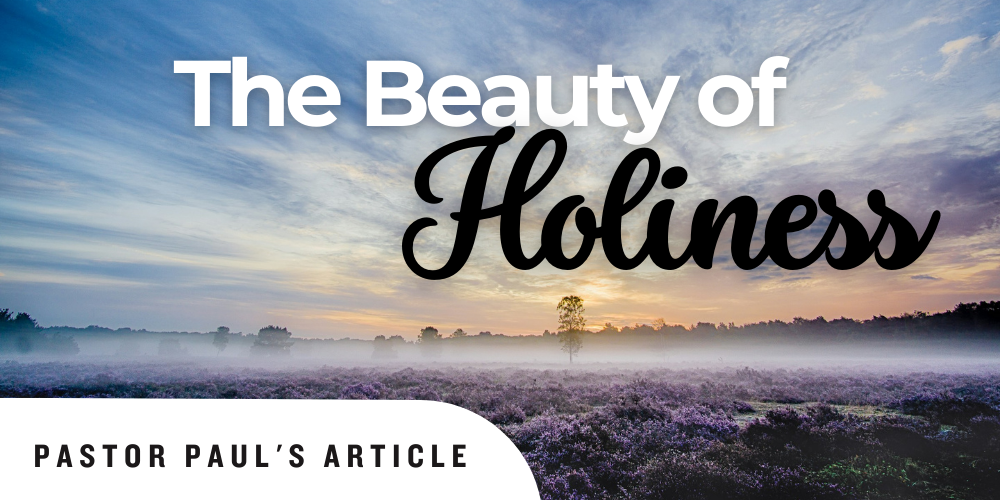1 Give unto the Lord, O ye mighty, give unto the Lord glory and strength. 2 Give unto the Lord the glory due unto his name;
worship the Lord in the beauty of holiness. (Psalm 29:1-2 KJV – see also Ps. 96:9; 1 Chron. 16:29)
Last Sunday we started looking at what I am calling, “The Beauty of Holiness,” in 1 Peter 1:13-2:11. The NASB95 translates the phrase above, “worship the LORD in holy array.” The ESV, “in the splendor of holiness.” Any way you translate it, contrary to modern thought, holiness is beautiful. When we are holy (set apart to God and for God), we may be ridiculed and scorned by the world for a brief time, but we will be honored by God for eternity. It will be worth it! We will learn a lot more about that as we study 1 Peter and receive encouragement to Stand Up & Stand Out for God.
There is a song called, “Holiness,” by Micah Stampley, that we used to sing frequently. It talks about holiness, righteousness, and brokenness being qualities the Lord desires for us. The first verse and chorus state:
Verse:
Holiness, holiness is what I long for
Holiness is what I need
Holiness, holiness
Is what You want for me
Chorus:
So, take my heart and mold it
Take my mind, transform it
Take my will, conform it
To Yours, to Yours, oh, Lord
In my reading to better understand holiness and its beauty, I came across an article written by Arthur W. Pink. Born in 1886, he was a spiritualist medium who was converted to faith in Jesus. He went on to pastor churches in the U.S. and Australia before returning to his homeland of Scotland in 1934. He died almost unnoticed in 1952, but the magazine he started in 1922, “Studies in the Scriptures,” was having a big impact on a growing number of people (including pastor D. Martyn Lloyd-Jones and founder of Inter-Varsity Christian Fellowship Douglas Johnson). After his death, his writings were put into book form and have impacted millions worldwide (including me). A few of his more well-known books include: The Attributes of God; The Sovereignty of God; The Seven Sayings of the Savior on the Cross; Gleanings from the Scriptures (on various books of the Bible and major themes); The Total Depravity of Man; Eternal Security; and The Doctrine of Sanctification.
Find a comfortable place away from distractions and prayerfully read the article below. Ask the Lord to help you understand how beautiful holiness is in His sight. Ask Him for the courage and discipline to be holy as He is holy even when the world says you are a fool. Ask Him for an eternal perspective so you will continue to pursue Standing Up & Standing Out for Jesus no matter what the cost.
The Beauty of Holiness by Arthur Pink
“Worship the Lord—in the beauty of holiness” (Psalm 29:2). Holiness is the antithesis of sin; and the beauty of holiness is in direct contrast from the ugliness of sin. Sin is a deformity, a monstrosity. Sin is repulsive, repellent to the infinitely pure God: that is why He selected leprosy, the most loathsome and horrible of all diseases, to be its emblem. When the Prophet was Divinely inspired to depict the condition of degenerate Israel, it was in these words, “From the sole of the foot even unto the head there is no soundness in it; but wounds, and bruises, and putrefying sores” (Isaiah 1:6). O that sin were sickening and hateful to us: not merely its grosser forms—but sin itself.
At the opposite extreme from the hideousness of sin is “the beauty of holiness.” Holiness is lovely in the sight of God: necessarily so. It is the reflection of His own nature, for He is “glorious in holiness” (Exo. 15:11). O that it may be increasingly attractive to, and earnestly sought after, by us!
Perhaps the simplest way of bringing out the beauty of holiness will be to contrast it from the beauties of time and sense.
First, the beauty of holiness is imperceptible to the natural man, and therein it differs radically from the beauties of mere nature. He [the natural man] can behold and admire a lovely glen, the softly flowing river, the mountain pines, the rushing waterfall; but for the excellence of spiritual graces—he has no eyes. He regards one who (by grace) meekly submits to sore trials—as a moral weakling. He looks upon one who denies self for Christ’s sake—as a fool. He considers the man who adheres strictly to the narrow way—as one who misses the best of this life. The natural man is totally incapable of discerning the excellence of that which is of great price in the sight of God.
Do some think we are stating this too strongly? Then let them be reminded of the solemn fact that when the Holy One tabernacled here upon earth, the unregenerate saw in Him “no beauty” that they should desire Him (Isaiah 53:2); and it is the same today. God must remove the scales from the eyes of our heart before we can perceive that holiness is beautiful.
Second, the beauty of holiness is real and genuine, and therein it differs radically from much of the beauty which is seen in this world. How much that appeals to the gaze of the natural man is artificial and fictitious. How much human beauty is made up, the product of the artifices of the salon. Even when physical beauty is natural, how rarely it is accompanied by moral virtues. No wonder our forefathers were accustomed to say, “Beauty is but skin deep.” Not so the beauty of holiness: it is rooted in the inner man and sheds its purifying influence over the entire being. “Favor is deceitful, and beauty is vain” (Proverbs 31:30). But holiness does not disappoint its possessor, for its beauty is spiritual and Divine. True, it has many counterfeits in the religious world—yet the genuine article has a ring to it, which the godly cannot mistake.
Third, the beauty of holiness is abiding, and therein it differs radically from all the beauty of earth. The wooded glen, whose varied tints are so pleasing in the summer sunlight, is leafless and drab when winter comes. The glorious sunset, which human skill can neither produce nor adequately reproduce, disappears within a few minutes. The fairest human countenance quickly withers: “all her beauty is departed” (Lam. 1:6). Even when it is preserved to the end of a short life, “their beauty shall consume in the grave” (Psalm 49:14). Yes, there is change and decay in all we see. The only beauty which is unfading and everlasting, is the beauty of holiness. The fruit of the Spirit will never lose its bloom! Spiritual graces shall endure after this poor world has all gone up in smoke. How fervently, then, should we pray, “Let the beauty of the Lord our God be upon us” (Psalm 90:17).
Fourth, the beauty of holiness is satisfying, and herein it differs radically from the beauty of the things of time and sense. Sooner or later they either weary on one—or else leave an aching void. Take the globe-trotter who journeys east and west, north and south, seeking fresh scenes. How soon he tires, discovering that the loveliest landscape cannot supply contentment of mind, and peace of heart. Man is more than a material creature, and therefore it requires something else than material things—no matter how beautiful—to meet his needs. It is the things of the Spirit which alone afford satisfaction.
“Godliness with contentment is great gain” (1 Timothy 6:6). True, the Christian is never satisfied with his own holiness: rather does he continue to hunger and thirst after righteousness to the end of his wilderness journey. Nevertheless, the holier we are—the closer we walk with God—the more real rest of soul shall we enjoy. And the blessed sequel will demonstrate the contrast still more plainly: instead of discovering that we have only chased the shadows, the Christian has the assurance: “I shall be satisfied, when I awake, with Your likeness” (Psalm 17:15).
Fifth, the beauty of holiness is glorifying to God, and therein it differs radically from much of human beauty. To glorify his Maker is the bounden duty of man, and nothing honors Him so much as our walking in separation from all that is displeasing to Him. But alas, physical charms and spiritual graces are rarely found in the same people. A notable example of this is seen in the case of Absalom, of whom it is recorded, “In all Israel there was none to be so much praised as Absalom for his beauty: from the sole of his foot even to the crown of his head—there was no blemish in him” (2 Samuel 14:25); yet he did not fear God and perished in his sins. How many a woman has used her personal attractions to entice men—rather than magnify God. How many a well-proportioned and handsome man has employed his gifts for self-glorification, rather than the praise of God. But the beauty of holiness ever redounds to the honor of its Author.
“O worship the Lord—in the beauty of holiness.” This is the only kind of beauty which the Lord cares for in our devotions. “Godliness is to the soul, as the light is to the world—to illumine and adorn it. It is not greatness which sets us off before God—but godliness” (Thomas Watson). Ornate architecture and expensive apparel—God has no delight in. It is the loveliness of inward purity and outward sanctity, which pleases the thrice Holy One. Sincerity of heart, fervor of spirit, reverence of demeanor, the exercise of faith, the outgoings of love, are some of the elements which comprise the “beauty of holiness” in our worship.
Holiness truly is beautiful! May all of us at The Bridge Bible Fellowship live holy lives putting the wisdom of God’s wisdom on display for a watching world. To God be the glory, great things He has done, is doing, and will do!

